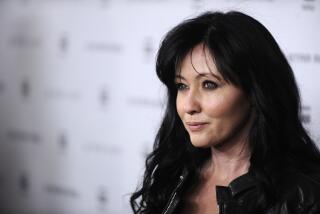From the Archives: Donna Reed, Oscar Winner and TV Star, Dies at 64
- Share via
Donna Reed, the Iowa farm girl who came west for a nice, steady secretarial job and found stardom instead, died early Tuesday at her Beverly Hills home of pancreatic cancer. She was 64.
Miss Reed, a major television figure in the late 1950s and early ‘60s as the mother of teen-agers on “The Donna Reed Show,” had been admitted to Cedars-Sinai Medical Center last month with bleeding ulcers, but exploratory surgery found the cancer, a family spokeswoman said.
When doctors decided that little could be done, she was released from the hospital Dec. 24 to spend the holiday season with her family. Her husband, retired Army Col. Grover Asmus, was at her bedside when she died at 9:17 a.m.
“The Donna Reed Show” was one of the most successful situation comedies of its time. It had made her a millionaire several times over, and Miss Reed, who won an Oscar as best supporting actress in 1953’s “From Here to Eternity,” had been in semiretirement for nearly two decades.
But she reappeared on the Hollywood scene in a big way in 1984, replacing an ailing Barbara Bel Geddes as the matriarchal Miss Ellie in the long-running nighttime TV soap opera, “Dallas.” That engagement ended badly a year later when, with Bel Geddes’ return to good health, the show’s producers dumped Miss Reed. She unsuccessfully sued for reinstatement to her job, but did receive a $1-million settlement. Despite the unpleasantness of that incident, Miss Reed will almost certainly be remembered by most Americans of a certain age as the perfectly coiffed mother in the TV program that bore her name.
She was Donna Stone, wife of small-town pediatrician Alex Stone and mother of a teen-age son and daughter. Like other TV mothers at the time—Harriet Nelson and Jane Wyatt who portrayed Margaret Anderson on “Father Knows Best”—she was warm, loving, understanding and puttered around the kitchen in pearls and heels. She dealt with the eternal problems of TV family life—little white lies, dates for the prom and measles—with humor and elan.
Her then-husband, Tony Owen, was the executive producer, having designed the show for her, and together they kept it going for eight years on ABC. It ran for four years in daytime reruns on that network and, still in syndication, is seen currently in some cities on independent stations and cable channels.
When ratings slumped and the program folded in 1966, Miss Reed found time to concentrate on her own family and grapple with problems bigger than Donna Stone’s.
She had been trained in the studio star system to keep her opinions to herself. She had been cast in movies, for the most part, as a wholesome, All-American girl. She had been a lifelong Republican. But suddenly, secure financially, Donna Reed spoke up.
She surprised many in Hollywood in 1967, when she became active in the antiwar movement and later was named Beverly Hills co-chairman of Another Mother for Peace, an organization opposed to U.S. involvement in Vietnam.
She told an interviewer then, “I’d been overwhelmed by hopeless despair over the war, having two sons who might have to go to Vietnam to fight in a war I don’t believe in. Then one night at a rally for Eugene McCarthy, a mike was put in front of me unexpectedly, and I heard myself speaking what I thought.”
Miss Reed also was active in an unsuccessful anti-nuclear power initiative drive in 1974.
Donna Reed had become something more than an Iowa farm girl who—according to her studio biography in the 1940s—had helped her parents around the house by driving a tractor and milking the cows.
Born Donna Mullenger on Jan. 27, 1921, in Denison, Iowa, she was, by all accounts, a typical farmer’s daughter, occupied with farm work and her high school studies. She was elected Campus Queen of Denison High, but, in her senior year, got an urge to move on.
She loaded her possessions into an old car and headed west, seeking not fame and fortune but a clerical career. She studied stenography and other secretarial chores at Los Angeles City College, appeared in a few campus plays and was once again elected Campus Queen in 1940.
Wholesomeness is not just its own reward in Hollywood. Three studios saw her picture in the paper and offered her screen tests.
Legend and the studio biographies claim that Miss Reed put Hollywood on hold for a time, waiting until she picked up her business degree. Then she tested opposite Van Heflin at Metro-Goldwyn-Mayer and was signed to a contract.
String of Films
She was typecast as a wholesome girl-next-door and later as an equally wholesome middle-American wife in a long string of movies.
Her early films included “Shadow of the Thin Man” (1941); “The Courtship of Andy Hardy” (1942); “Calling Dr. Gillespie” (1942); “See Here Private Hargrove” (1944); “The Picture of Dorian Gray” (1945); “They Were Expendable” (1945), and “It’s a Wonderful Life” (1946).
The latter movie, undoubtedly one of Miss Reed’s best, is a Christmas season evergreen. Directed by Frank Capra, it saw Miss Reed cast as James Stewart’s wife. Stewart played a savings and loan officer driven to the brink of suicide at Christmas time.
Miss Reed did “Green Dolphin Street” in 1947 and 20 more films, mostly mediocre, over the next 15 years. The exception was Fred Zinneman’s “From Here to Eternity,” in which she, at last, was not typecast. She played Alma, a prostitute. The film garnered several Academy Awards, including Miss Reed’s.
Studio System
Those who were surprised by Miss Reed’s outspokeness in the 1960s and ‘70s might have been less shocked if they had remembered the Donna Reed of the 1940s’ studio system.
She was a bit of a troublemaker from the beginning, complaining to MGM boss Louis B. Mayer about the Andy Hardy role, only to find herself exiled--on loan to Paramount.
When her contract was up and she switched to Columbia, she got lucky for a time, when the studio boss there, Harry Cohn, had Zinneman, who wanted Julie Harris for the role, cast her in “From Here to Eternity.”
Neither was she beloved by the directors with whom she worked. Early in her career, she described most of them as incompetents who “hated women, which is why they make their female characters as unpleasant as possible.”
After her Columbia contract, Miss Reed, then married to Owen, a former Cohn studio aide, did the TV series with her co-stars: the late Carl Betz, Paul Petersen and Shelley Fabares. When “The Donna Reed Show” went out of production, there was little else that interested her.
Instead, she concentrated on family life.
Raised Children
Divorced in 1947 after a two-year marriage to her first husband, makeup man William Tuttle, she married Owen that same year and raised four children. Divorced from Owen, she married Asmus a decade ago. With her children grown, she agreed to the “Dallas” deal, only to see it end painfully.
Regrets about that surfaced Tuesday with news of her death.
“She was hurt and rightfully so,” said former “Dallas” producer&mash;now creative consultant—Leonard Katzman. “But decisions are sometimes made in the name of ratings, and I think that was one of them. . . . She was just a lovely person.”
Frank Sinatra, who appeared with her in “From Here to Eternity,” called her “a lovely lady, gentle and kind.”
“I can remember in the beginning when every guy, particularly myself, who saw her on the screen had a crush on Donna,” Sinatra said.
A spokesman for the family said funeral services will be at Westwood Cemetery at a time and date to be announced.
More to Read
Start your day right
Sign up for Essential California for the L.A. Times biggest news, features and recommendations in your inbox six days a week.
You may occasionally receive promotional content from the Los Angeles Times.







